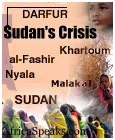 |






 AfricaSpeaks Weblog AfricaSpeaks Weblog
 Rootswomen Weblog Rootswomen Weblog
 Rootsie's Weblog Rootsie's Weblog
|
Code Word: Containment
Posted: Wednesday, August 14, 2002
by Jeff Guntzel, CommonDreams.org
There's a war coming, or so George W. Bush would have us believe. But voices from around the world, and right here at home, are urging restraint. A recent poll in the UK, our most likely ally in a war against Iraq, revealed that a full two-thirds of British voters feel an attack on Iraq under present circumstances would be unjustified. Meanwhile, allies from Germany to Jordan have expressed outright rejection or major apprehension over Bush administration rhetoric.
Here at home U.S. House of Representatives Majority Leader Dick Armey, a Texas Republican, made headlines last week when he told reporters the United States had no business attacking Iraq without sufficient provocation. Armey was joined on Sunday by Democratic Senator Carl Levin, chairman of the Senate Armed Services Committee, who told reporters that he believed Saddam Hussein posed no serious danger to the United States. He challenged the Bush Administration's narrow approach to a complex conflict, and then he said something scary: "Containment is working."
"Containment" is the new code word for sanctions, a policy that has caused the deaths of hundreds of thousands of innocent Iraqis and the destruction of a once thriving society.
This week marked the third year since UNICEF published results of its study of child and maternal mortality in Iraq. This study, the first of its kind since before the Gulf War in 1991, pronounced "an ongoing humanitarian emergency."
According to the report, if the substantial reduction in child mortality throughout Iraq during the 1980s had continued through the 1990s, there would have been half a million fewer deaths of children under-five in the country as a whole during the eight year period 1991 to 1998. Speaking to the press, then executive director of UNICEF Carol Bellamy pointed to a recent statement of the Security Council Panel On Humanitarian Issues in Iraq which explained, "Even if not all suffering in Iraq can be imputed to external factors, especially sanctions, the Iraqi people would not be undergoing such deprivations in the absence of the prolonged measures imposed by the Security Council and the effects of war."
That was three years ago. The sanctions were 9 years old. Now they are 12, and the "humanitarian emergency" continues in Iraq. This is the cost of containment.
Perhaps unwittingly, Senator Levin thrust us back in time to 1990, when, after Iraq's invasion and occupation of Kuwait, some members of the US congress (and much of the left) were pushing for sanctions on Iraq as an alternative to war.
But today, a dozen years and many thousand senseless deaths later, we know that sanctions are war. And we know that an economic war can be just as deadly as a war fought with armies, or more so.
Three years to the day after the largely ignored UNICEF study was released, CAFOD, a British Catholic aid agency, released its own report on Iraq under sanctions. The report, "Iraq, Sanctions, and the War Against Terrorism," is a damming critique of sanctions and the Bush Administration's zombie-like march to a new war against Iraq.
"Sanctions imposed on Iraq, now in their 11th year, have resulted in untold suffering for millions of people - physical, mental and cultural," the report says, "The effects of sanctions - even were they to be lifted today - will certainly be felt for many years to come. It is indelibly imprinted on the Iraqi psyche. A once prosperous nation - home to the world's second-largest oil reserves - is being systematically de-developed, de-skilled and reduced to penury."
Julian Filochowski, Director of CAFOD, added: "We seem to be moving inexorably closer to war with Iraq, with a focus on the person of Saddam Hussein whilst millions of poor Iraqis, who will be the ones to suffer and who themselves do not have weapons of mass destruction, are seemingly left out of consideration."
The report concludes: "The danger of unilateral action, in the form of a pre-emptive strike by the United States (possibly with the support of the UK) cannot be underestimated. It would be difficult to imagine a single, more effective way of wreaking further devastation on an already devastated country - and creating a major humanitarian crisis with hundreds of thousands of innocent victims. A militaristic or purely security approach to the problem of international terrorism is unimaginative and doomed to failure. Only if the world is prepared to tackle the root causes of conflict, liberation struggles, terrorism (including state terrorism) is there a chance of arriving at durable and sustained solutions."
The containment of Saddam Hussein has come at the cost of the lives and livelihood of millions of ordinary Iraqis. By what measure has policy, as Senator Levin so plainly put it, "worked well?"
If we aren't careful, we will be tricked into accepting sanctions as an alternative to war. War for war is not a fair trade; it's a cruel trick with devastating consequences.
So what is to be done? First, we must accept that there is no quick fix. The problem of Saddam Hussein does not begin or end with one man. Overcoming tensions and violence in the Middle East is a monumental undertaking.
A critical first step could be taken by the United States. For decades, the United States has used threat, coercion, and war as tools for achieving and maintaining its geopolitical interests in the Middle East. We have played one side against the other, as we did in the decade-long Iran-Iraq war, and watched the grievances (and the bodies) pile high.
What we need is a new toolbox. Instead of threats, we need incentives; instead of coercion, we need dialogue; and instead of spending billions of dollars on a war that will only win us more enemies and risk plunging the Middle East further into chaos, we need to put an immediate end to the failed policy of sanctions.
There are those who would argue that this would amount to a propaganda victory for Saddam Hussein. Hans von Sponeck, a former UN Humanitarian Coordinator in Iraq who resigned from his post in protest, reminds us that, "The resolution of this major international conflict is a pre-condition for averting a deepening global crisis. [It] is not about saving political faces but about saving human lives. The urgency of the moment is for the international community to end one of the great injustices of our time."
Jeff Guntzel is co-coordinator of Voices in the Wilderness, the first U.S. grassroots organization to bring activists into Iraq to witness the effect of sanctions, to bring food and medicine to the people of Iraq, and to educate the public upon their return. Jeff can be reached at jeff@vitw.org
 Printer friendly version Printer friendly version
 Send page by E-Mail Send page by E-Mail
|








